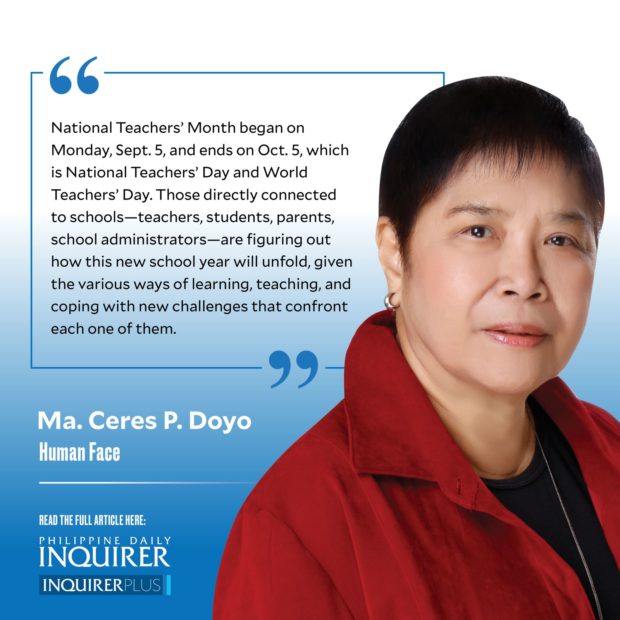Reinventing teaching of reading and writing

Teaching is the profession that teaches all the other professions.” (Anonymous)
National Teachers’ Month began on Monday, Sept. 5, and ends on Oct. 5, which is National Teachers’ Day and World Teachers’ Day. Those directly connected to schools—teachers, students, parents, school administrators—are figuring out how this new school year will unfold, given the various ways of learning, teaching, and coping with new challenges that confront each one of them. COVID-19 is still very much around despite the vaccinations. The so-called “new normal” can still yield to “newer normals,” depending on the situation ahead.
Some days ago, I was with friends who had spent most of their lives teaching students and teaching teachers how to teach effectively. Though they have all retired from the academe, they—with their years of teaching experience and Ph.D.s in tow—continue to teach and mentor teachers when called upon. For more than a decade, they were the indefatigables of the Mentoring the Mentors Program (MMP), a brainchild of Inquirer founding chair Eugenia Apostol through her Education Revolution, and Chinit Rufino of the Marie Eugenie Institute of Assumption College. The two women had merged their respective visions to form MMP and snared in veterans from the teaching field.
I was often invited to MMP’s yearend gatherings as if I were part of the program. I think it was because I was present at its conception and I fired the first salvo in media when MMP was off and running. I wrote about MMP’s feats. Alas, after more than 15 years of mentoring teachers, MMP ceased operations because of the COVID-19 pandemic. But note that on their own, MMP’s tried and tested mentors are still at it when the need arises.
The highlight of our lunch meeting was Leticia Martin’s presentation of her three “Learn to Write” and “Learn to Read 1 and 2” ring-bound guide books (illustrated by Germinia Vecino) for the primary grades. These were initially printed by a foundation for the use of their adopted schools. Martin owns the copyright, but these can be available to interested publishers. Martin disclosed that one interested party wanted to buy the copyright. “No!” I interjected, “your opus might lie there and die there.”
Martin has done some pilot testing of her work, one with school teachers in Southern Luzon where MMP had often been invited by a corporation (with CSR or corporate social responsibility in its DNA) that helps schools in surrounding communities. I had heard stories about how MMP mentors had been treated generously and how teachers responded so well in that part of the woods.
Martin showed the result of her recent mentoring foray in that area—a well-collated output of teaching materials done by the seminar attendees themselves, with colored illustrations, graphics and all, downloaded from the internet. Whoa! Awesome is the word for what the teachers could do! The teachers only had to have their laptops. Internet, paper, and printers were provided for their use at the seminar. Talk of CSR at work, indeed.
“See how the teachers can produce their own teaching materials!” Martin exclaimed. The teachers had Martin’s “Writing and Reading Readiness Program Handbook” for their use and to tap into their creative juices.
The downside to all these, the mentors bewailed, is that public school teachers are so overloaded with work, they have so many papers to submit to their superiors, so many extra tasks awaiting them, not to mention the poor teaching environments that they find themselves in.
It is always, if not often, the schoolchildren that are placed at the center stage of education programs and research. Their learning skills are tested, computed, and judged. Statistics establish their level of proficiency in reading, writing, and comprehension. What about their teachers? How to increase their level of competency and their zeal? How do we reward them for their backbreaking work?
It was during our lunch meeting that I learned from these grizzled teaching veterans that teaching reading and writing to first graders do not necessarily begin with the first letters of the alphabet A, B, and C, but with letters M, S, A, E, I, and O. It is called the Marungko approach that originated in the University of the Philippines.
At our meetings’ end, we all agreed that Martin’s groundbreaking effort should be named, if it has to be named: “Alternative Approaches for Teaching Reading and Writing in the Early Grades.” (If interested in the books and seminar, call 0905-2605391 or 02-799-6681.)
Hail, teachers! I think teaching is the oldest profession.
—————-
Send feedback to cerespd@gmail.com




















